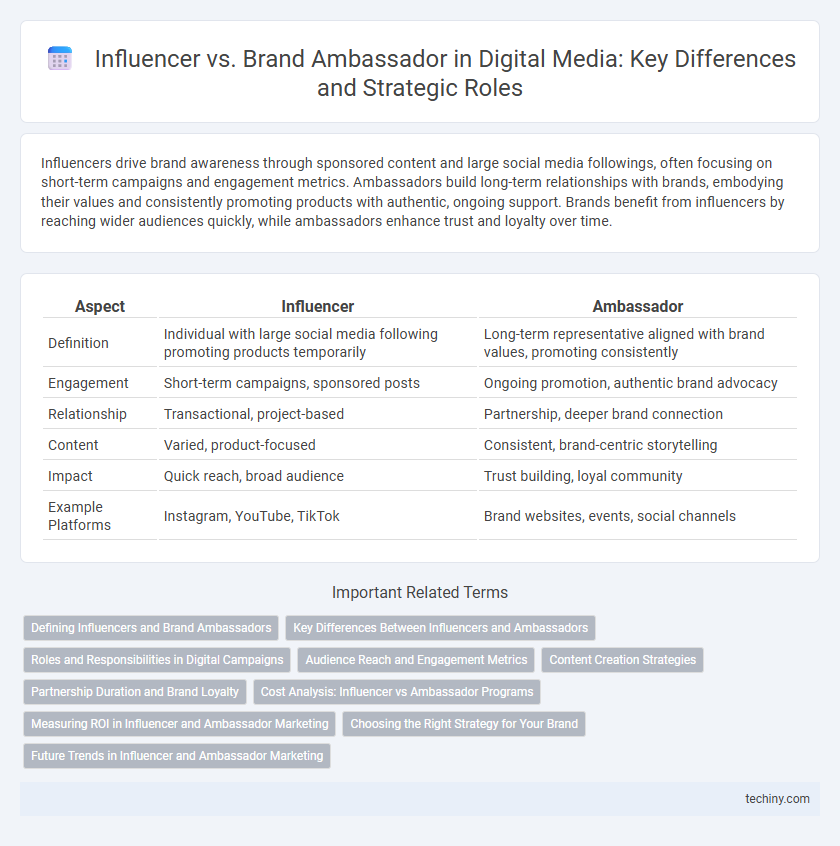Influencers drive brand awareness through sponsored content and large social media followings, often focusing on short-term campaigns and engagement metrics. Ambassadors build long-term relationships with brands, embodying their values and consistently promoting products with authentic, ongoing support. Brands benefit from influencers by reaching wider audiences quickly, while ambassadors enhance trust and loyalty over time.
Table of Comparison
| Aspect | Influencer | Ambassador |
|---|---|---|
| Definition | Individual with large social media following promoting products temporarily | Long-term representative aligned with brand values, promoting consistently |
| Engagement | Short-term campaigns, sponsored posts | Ongoing promotion, authentic brand advocacy |
| Relationship | Transactional, project-based | Partnership, deeper brand connection |
| Content | Varied, product-focused | Consistent, brand-centric storytelling |
| Impact | Quick reach, broad audience | Trust building, loyal community |
| Example Platforms | Instagram, YouTube, TikTok | Brand websites, events, social channels |
Defining Influencers and Brand Ambassadors
Influencers are individuals who leverage social media platforms to affect the purchasing decisions of their followers through authentic content and broad reach, often collaborating with multiple brands. Brand ambassadors maintain a long-term relationship with a specific company, consistently representing its values and products to cultivate ongoing trust and brand loyalty. Distinguishing influencers by their campaign-based engagements and ambassadors by their dedication to brand advocacy is crucial for tailored digital media strategies.
Key Differences Between Influencers and Ambassadors
Influencers primarily engage audiences through sponsored content and short-term collaborations, leveraging their large follower base to promote products or services. Ambassadors maintain long-term partnerships, embodying brand values and consistently representing the brand across multiple platforms. While influencers prioritize reach and engagement metrics, ambassadors focus on brand loyalty and deeper consumer trust.
Roles and Responsibilities in Digital Campaigns
Influencers primarily engage audiences by creating authentic, relatable content that drives immediate brand awareness and engagement through their personal channels. Ambassadors embody long-term partnerships, consistently representing the brand's values and messaging across multiple campaigns to build sustained trust and loyalty. Both roles require strategic alignment with brand objectives, but influencers focus on short-term impact while ambassadors contribute to enduring brand reputation in digital media.
Audience Reach and Engagement Metrics
Influencer marketing leverages individuals with large, often niche social media followings to generate high audience reach and measurable engagement through likes, comments, and shares. Brand ambassadors typically maintain long-term partnerships, fostering deeper brand loyalty and consistent engagement across multiple platforms. Engagement metrics for influencers highlight campaign spikes, while ambassadors deliver sustained interaction and audience trust.
Content Creation Strategies
Influencers often leverage their personal brand and authenticity to create engaging, relatable content that resonates with their followers, relying heavily on storytelling and trend adaptation. Brand ambassadors consistently produce tailored content aligned with a company's long-term marketing goals, emphasizing brand loyalty and product expertise through regular postings and collaborations. Effective content creation strategies for both roles involve understanding audience demographics, utilizing multimedia formats, and maintaining consistent messaging to maximize digital engagement and conversion rates.
Partnership Duration and Brand Loyalty
Influencer partnerships typically involve short-term collaborations focused on specific campaigns or product launches, allowing brands to leverage immediate reach and trend-driven engagement. Brand ambassadors engage in long-term relationships, fostering consistent brand loyalty and authentic representation that strengthens consumer trust over time. The extended duration of ambassador partnerships enhances brand credibility by aligning the influencer's ongoing personal values with the brand's mission.
Cost Analysis: Influencer vs Ambassador Programs
Influencer programs typically demand higher short-term costs due to varying rates per campaign and audience reach, while ambassador programs involve longer-term investments with stable, often lower ongoing fees. Ambassadors provide sustained brand loyalty and authentic engagement, reducing acquisition costs over time compared to influencers' higher one-time payouts. Evaluating ROI, brands find ambassadors more cost-effective for deep, continuous engagement, whereas influencers are suited for rapid, high-impact visibility within limited budgets.
Measuring ROI in Influencer and Ambassador Marketing
Measuring ROI in influencer marketing involves tracking engagement metrics, conversion rates, and direct sales attributed to influencer content, leveraging tools like affiliate links and promo codes for precise data. Ambassador marketing ROI focuses on long-term brand loyalty and sustained customer engagement, often requiring analysis of lifetime customer value and repeat purchase rates. Both strategies demand robust analytics platforms to isolate impact and guide budget allocation for maximum digital media effectiveness.
Choosing the Right Strategy for Your Brand
Selecting between an influencer and a brand ambassador hinges on your campaign goals and audience engagement needs. Influencers offer short-term, high-impact reach through diverse platforms, ideal for product launches and viral content. Brand ambassadors provide consistent, long-term representation, fostering deeper trust and loyalty by embodying the brand's values over time.
Future Trends in Influencer and Ambassador Marketing
Influencer marketing is evolving with a shift towards long-term ambassador partnerships that foster authentic brand loyalty and deeper audience engagement. Advances in AI-driven analytics and personalized content creation will enable brands to identify and collaborate with micro-influencers and ambassadors who resonate best with niche markets. The future emphasizes seamless integration of influencer and ambassador roles through immersive experiences like augmented reality, enhancing storytelling and consumer trust in digital media campaigns.
Influencer vs Ambassador Infographic

 techiny.com
techiny.com